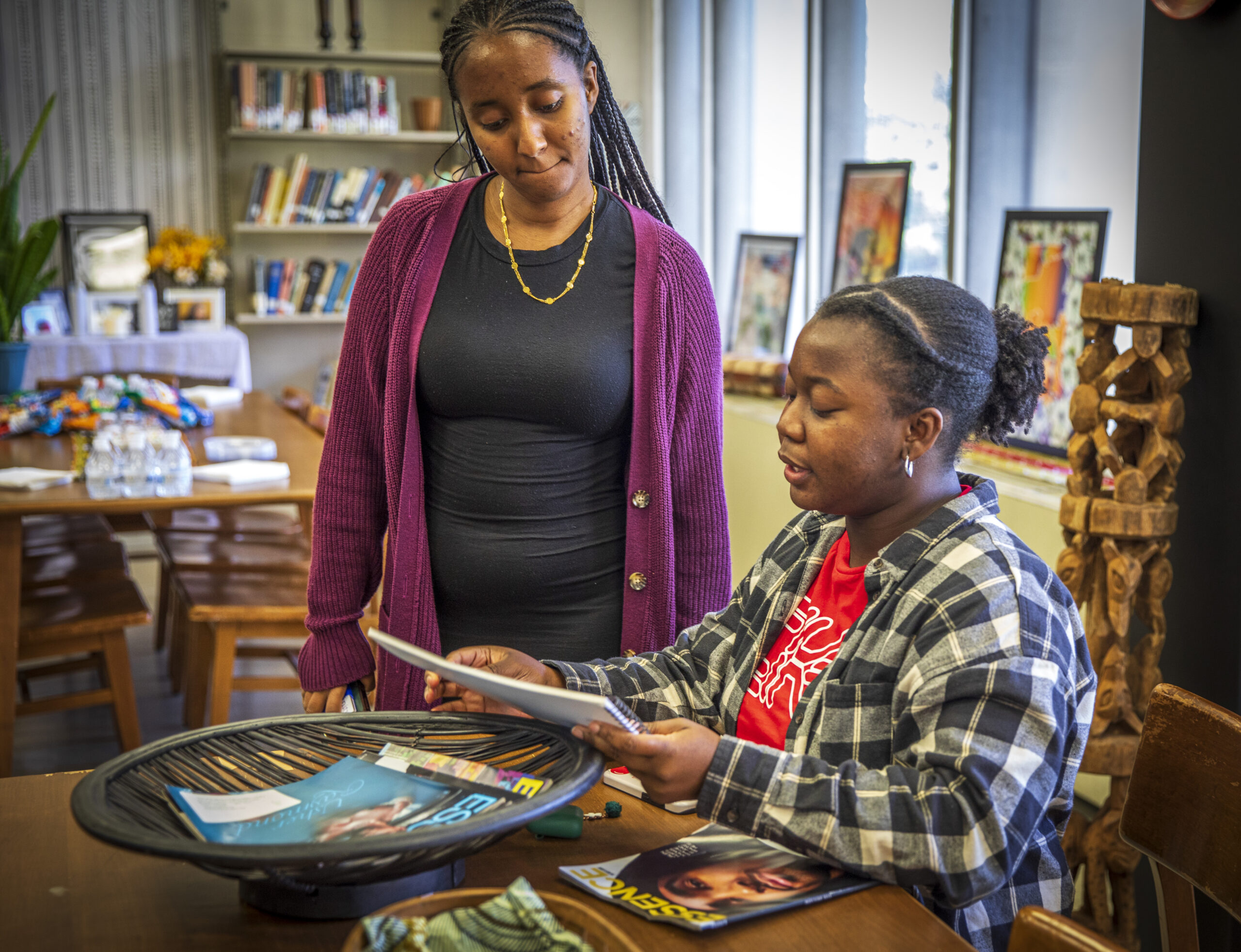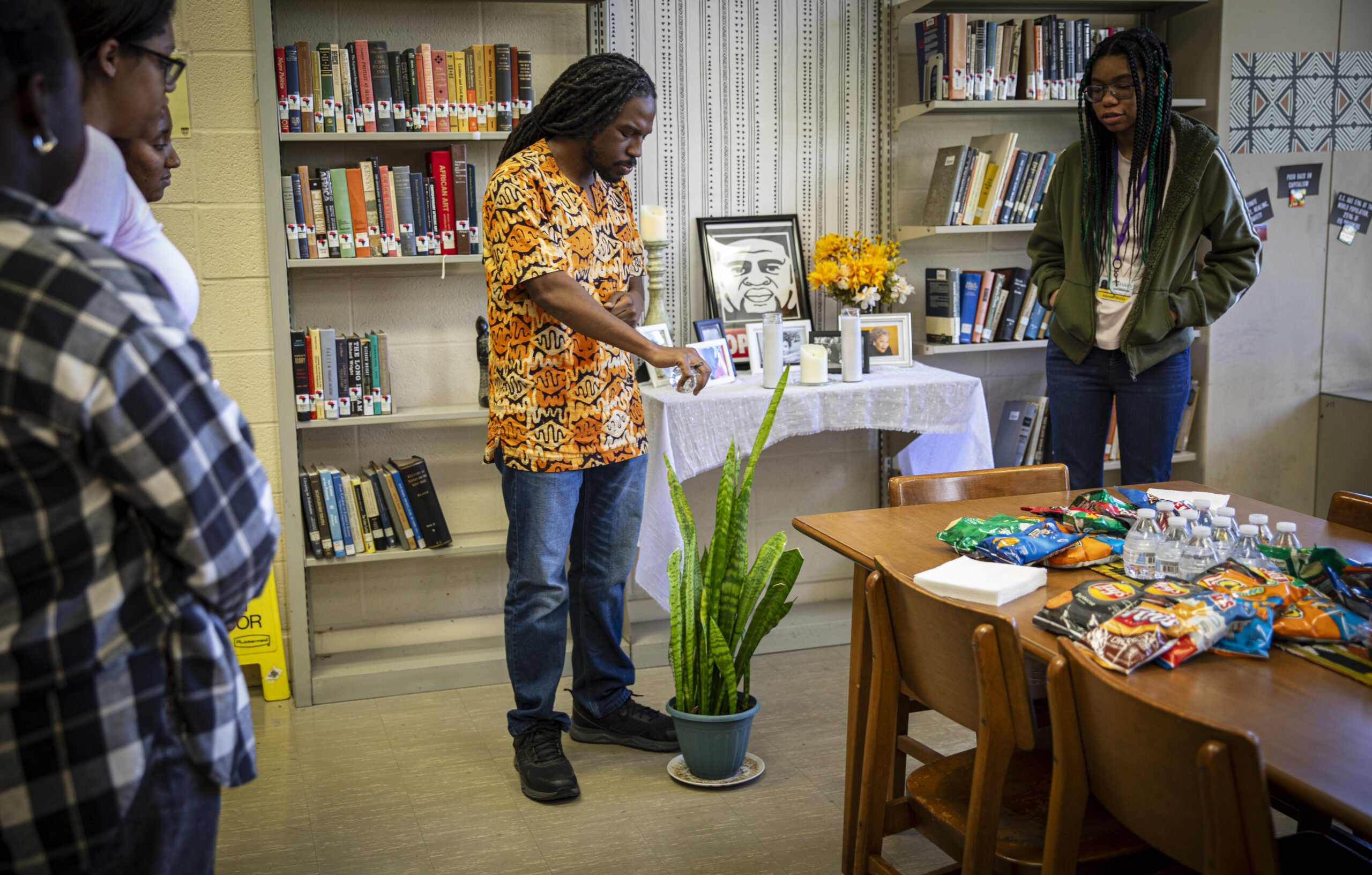
By Saron Gebereegziabhier
Trinity Times Correspondent
A new chapter in Trinity Washington University’s rich history of inclusivity and academic exploration has been inaugurated with the opening of the Africana Studies Reading Room on the second floor of the Sister Helen Sheehan Library.
More than just a quiet place for study, this space symbolizes the university’s ongoing commitment to celebrating diverse cultures and intellectual perspectives, said Kimberly F. Monroe, assistant professor of Africana Studies and History at Trinity, during a Sept. 4 dedication ceremony of the new reading room.
Flanked with African artwork, reading material and flickering candles, the opening ceremony attracted Trinity students, faculty and staff, expressing their appreciation for the opportunity to dedicate the room with an African libations’ ritual.
It’s not just a room — it’s a testament to the power of collaboration and the recognition of history, said Monroe, who also teaches classes in Trinity’s Africana Studies minor, adding that the space is destined to inspire future generations of scholars.
The establishment of the new Africana Studies Reading Room was initiated by Monroe in collaboration with Trinity’s librarian Trisha Smith and it’s intended to serve as a hub for reflection, learning, and dialogue on the profound contributions of Africa and the African diaspora.
Trinity students, faculty and staff all pitched in to help make the new reading room a reality by contributing their unique perspectives and experiences to the project.
This space now stands as a focal point for the Africana Studies program, providing a home for critical texts, artifacts, and resources that highlight African and African American histories, cultures, and contributions to the global stage, Monroe said.
With vibrant murals and art pieces adorning the walls, the room offers both an academic sanctuary and a cultural immersion experience for students eager to deepen their understanding of the voluntary and involuntary movement of Africans and their descendants to various parts of the world during the modern and pre-modern periods.
Beyond its academic significance, the room represents something even more powerful: Trinity’s ongoing dedication to diversity, inclusion, and the celebration of all identities.
For many students, this space will be a source of pride and a reminder that their histories and voices matter.
As students and scholars’ step through the new reading room doors, they are met with not just a room but a platform that encourages the exploration of cultural heritage and serves as a call to action for continued advocacy, justice, and understanding within both the campus and the wider world.
Chad Kehinde Graham, who is pursuing his PhD in African Studies at Howard University, performed the libation ritual during the dedication ceremony, reflecting the Africana Studies Reading Room’s profound cultural and intellectual significance.
Graham told Trinity Times he was thrilled to be a part of dedicating the room, noting that Monroe invited him to bring the key component to the reading room’s opening.

“Dr. Kim Monroe, first a colleague and now a friend of mine, asked me to take part in this opening by pouring libations,” he said. “I’ve had the honor of presenting in some of her classes over the past few years, going back to 2021. She’s an innovative educator, always seeking different ways and voices to empower her students. It’s a huge honor, and I’m grateful for her and to be part of this.”
The libation ritual included pouring water into a plant while the attendees responded with “Ashe” (pronounced ah-SHAY), a Yoruba word akin to “Amen.”
“Ashay is not just an affirmation,” Graham said. “It’s a way to drive and push energy into things. The ritual we engaged in, called libations, is like a non-denominational prayer, but it’s more than that. Not only are you calling on the creator, but you are also affirming and giving energy to the needs of others, our community, and the entities we acknowledge. By pouring into a plant or the earth, we are giving energy back into the cycle of life. We want that energy to uplift this space.”
During the dedication ceremony Graham eloquently framed the significance of the Africana Studies Reading Room as a symbol of resilience, knowledge, and history for African Americans in the United States.
“African people have rich histories and traditions of preserving our information, our history, and our culture,” he said. “This space is a physical manifestation of that long struggle. A long genealogy of African people studying themselves and preserving their culture. This is just the beginning, and this collection will continue to expand.”
The impact of this space on the Trinity student body is already being felt.
“Seeing the Africana Studies Reading Room shows the campus is committed to understanding and celebrating Africana culture, which is personally meaningful to me,” said Bethlehem Sileshi, a Trinity sophomore majoring in biology, who attended the dedication ceremony.
For students who have longed for a dedicated space to explore Africana studies, this room signifies not only recognition but also a profound sense of belonging.
It provides an inviting environment for students to engage with others who share a passion for African and African American history while also encouraging discussions that bridge cultural gaps across the campus community.
Looking ahead, students told Trinity Times they envision the room becoming a center for dynamic interactions — an academic and cultural hub where meaningful dialogue takes place. “I see this space being used for events like talks and group projects,” Sileshi said, emphasizing the room’s potential to host activities that spark learning and collaboration.
For members of Trinity’s Black Student Alliance (BSA), the establishment of the Africana Studies Reading Room is a significant milestone, aligning directly with their mission to honor and uplift Black culture on campus.
The space serves as a haven where Black students can gather, reflect on their shared experiences, and deepen their understanding of the African diaspora, said Lakshmi Mosquera-Herrera, vice president of the BSA.
“Our mission is aligned with this platform as it allows us to amplify the voices of Black individuals, share knowledge, and advocate for meaningful changes that promote inclusivity at Trinity,” Mosquera-Herrera said.
The BSA plans to utilize the room as a hub for hosting meetings, cultural celebrations, academic workshops, and seminars — transforming it into a vibrant center for intellectual and cultural exchange.
“For the Black Student Alliance, this room represents the importance of being seen, recognized, and empowered,” Mosquera-Herrera told the crown who gathered for the opening ceremony. The space, she explained, stands as an acknowledgment of the vital contributions of Black individuals to both academia and culture while also fostering a sense of community.
What a wonderful concept, and now reality! To have a space dedicated to Black Culture and Scholarship in the Sr. Helen Sheehan Library at Trinity means we will have a concrete acknowledgement of Black history and culture every day. Thank you, Dr. Monroe and all who brought this reality to our campus.–Sr. Ann